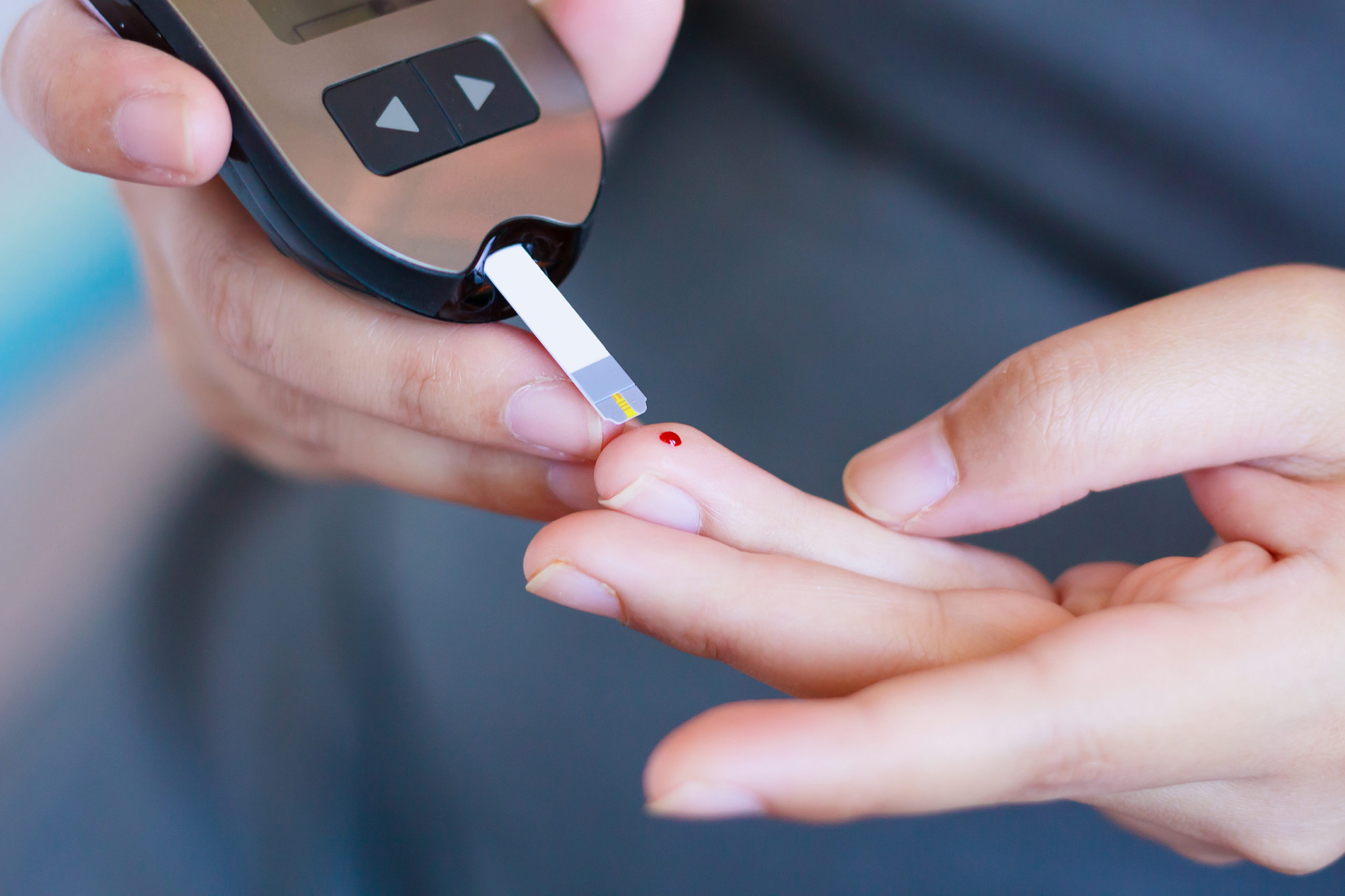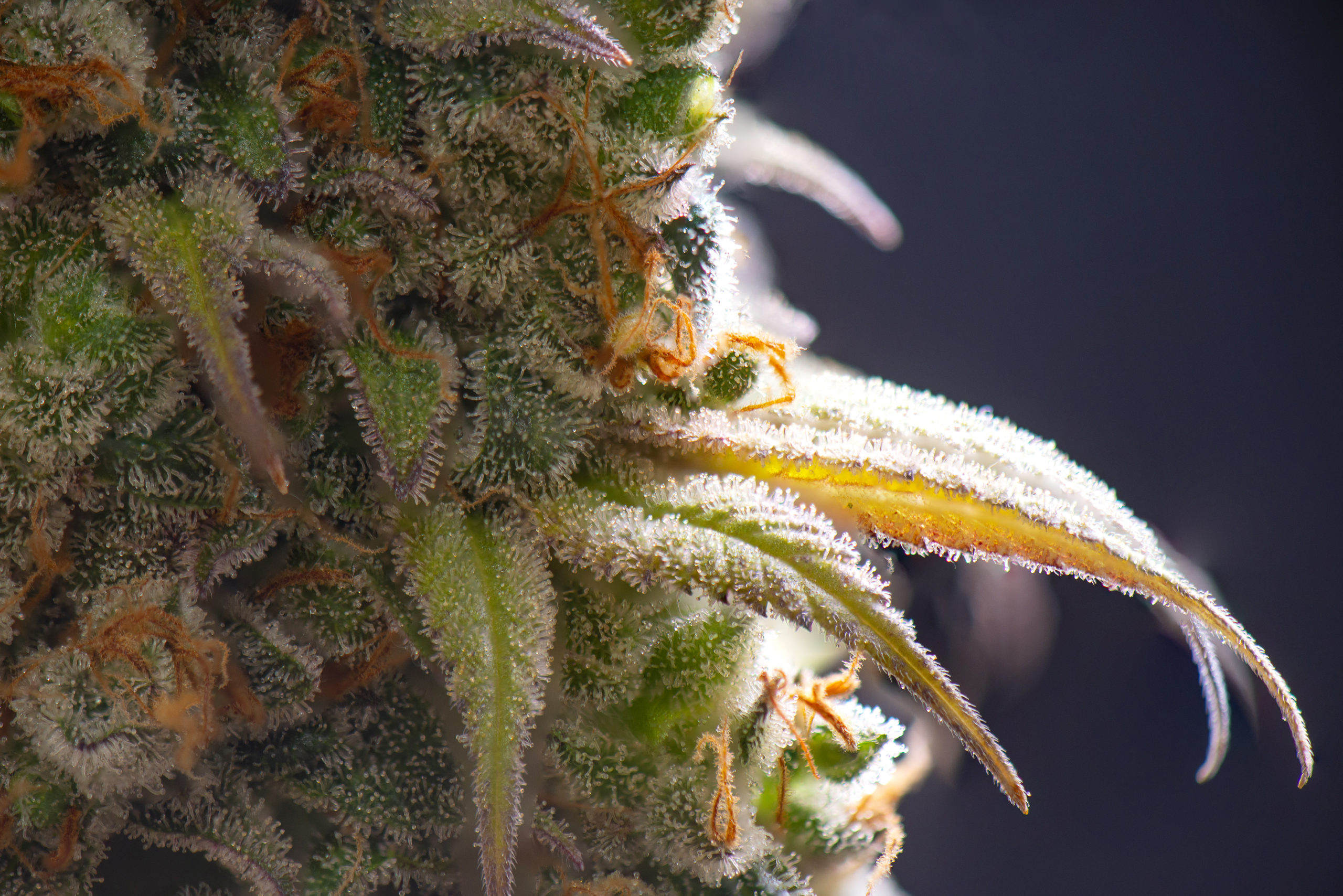-
- Market Research
- |
- CBD Near Me
- |
- Giveaways
- |
- Newsletter
- |
- Contact
- |
- Advertise
- |
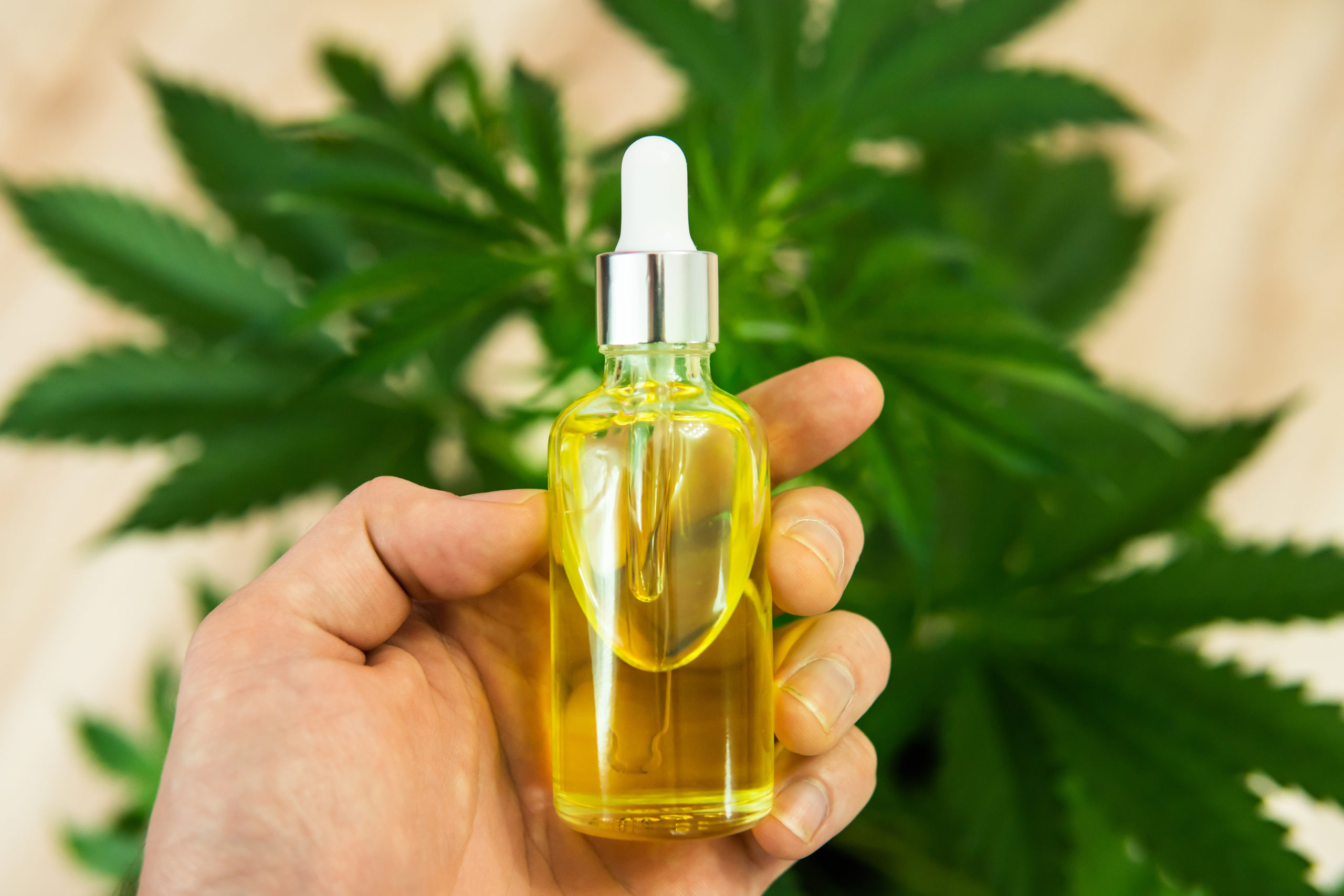
Yes, CBD oil is typically well-tolerated. However, as with any supplement or medication, you should always consult with your medical advisor before use. In a pre-review report on CBD, the World Health Organization’s expert committee on drug dependence stated, “In humans, CBD exhibits no effects indicative of any abuse or dependence potential.” The report also says, “CBD is generally well tolerated with a good safety profile.”
Is CBD Oil Safe?
While CBD has a strong safety profile, as is the case with most supplements and medications, CBD oil does not come without some risks.
Contraindications
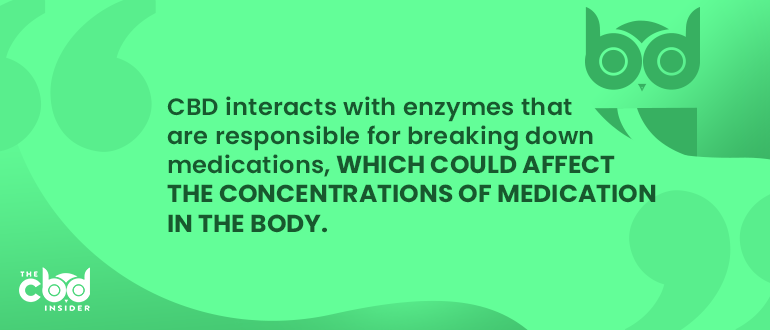
One consideration that users of CBD oil should be aware of is the potential for contraindications with other medications. Our bodies use specific enzymes (CYP group) to break down certain exogenous compounds. This is the first step of the process that allows these compounds to reach systemic circulation.
The potential risk in this situation occurs when CBD users are also using medication(s) that rely on the same enzymes for absorption. In this case, CBD can increase how quickly the body metabolizes other medications. This can result in higher than expected concentrations of medication in the user.
Not all medications rely on these enzymes. It is estimated that 70-80% of medicines utilize CYP enzymes [9]. Types of medications that may interact with CBD include but aren’t limited to:
- Antihistamines
- Benzodiazepines
- PDE5 Inhibitors
- Beta Blockers
- Antipsychotics
- SSRIs and Tricyclic Antidepressants
Although you should certainly speak with your doctor before using CBD oil if you are concerned about potential interactions, it doesn’t mean that CBD oil won’t work for you. Possible interactions like these are relatively common in modern medications. Even certain foods like grapefruits may potentially interact with prescription medications.
In most cases, your medical provider will work with you to develop a monitoring protocol to detect any interactions as soon as or if they occur.
Limited Research Available
Even though the list of potential health benefits from CBD seems to be continually growing, we have to remind ourselves that much of the evidence behind the claims remains preclinical and anecdotal. This doesn’t discredit CBD’s potential impact in the lives of millions but serves as a reminder that CBD isn’t a one size fits all solution.
The reason behind the limited information falls is attributable to the former legal statuses of CBD and hemp. Until the passing of the 2018 Farm Bill, researchers faced multiple entry barriers if they wished to study hemp and/or CBD. Although regulatory hurdles have become less prominent, researchers are now faced with playing a game of catchup.
To date, Epidiolex, a prescription drug used in the treatment of seizures spanning from Lennox-Gastaut syndrome and Dravet syndrome, is the only FDA-approved CBD product. This was largely seen as an opening of the floodgates for labs around the nation to begin their own in-house studies. According to the US National Library of Medicine, there are currently 390 new clinical trials involving CBD/cannabidiol.
Low-Quality Products
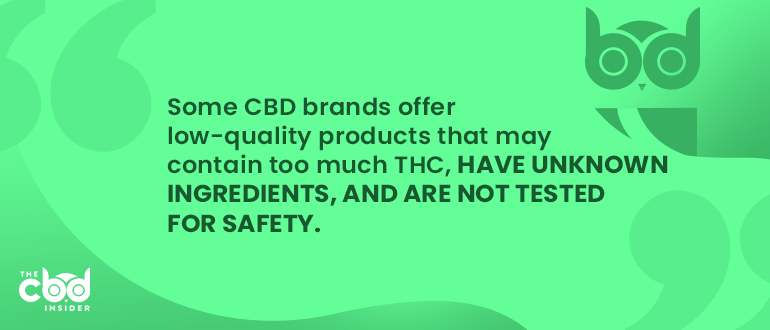
As in most industries, there is always the risk of running into unscrupulous brands, and the CBD industry is no different. Though most brands have the best interest of their customers in mind, some sell CBD for a quick buck.
The best way to protect yourself from questionable CBD products is by being an educated user. Previously a daunting task, staying on top of CBD news, reviews, and all things CBD can now be accomplished quickly and easily by visiting our CBD knowledge center.
This is a free resource for anyone interested in CBD. Here you’ll learn the ins and outs of making sure your CBD product is as the label describes. Understanding CBD brands’ certificates of analysis, calculating dosage based on your product, and checking your favorite CBD brand’s reputation with our Trusted Brands tool are all things that you’ll have access to.
CBD Oil Side Effects
In a 2017 study on the safety and side effects of cannabidiol (CBD), published by the Journal of Cannabis and Cannabinoid Research, scientists concluded that the most frequently reported side effects were tiredness, diarrhea, and changes in appetite/weight.
Although the study’s summary included commentary on the need for additional clinical research to definitively address all of CBD’s potential side effects, researchers concluded that, “In comparison with other drugs, used for the treatment of these medical conditions, CBD has a better side effect profile.”
Furthermore, in December 2019, CBDistillery conducted an internal survey of 2,000 customers and found that 93% of people don’t feel side effects from CBD use. [16]
Is CBD oil safe for pets?
Our furry friends suffer from many of the same ailments as we do, so, understandably, we would consider adding CBD oil into their lives as well. As is the case with humans, much research remains to be done on CBD’s long-term effects on pets.
That said, early reports like this one by Cornell University, which looked at CBD use in dogs diagnosed with osteoarthritis, suggests that “2mg/kg of CBD twice daily can help increase comfort and activity in dogs with OA.” [18] The study did note an increase in alkaline phosphatase (ALP) in dogs receiving CBD.
Another study published by the Journal of the American Holistic Veterinary Medical Association (JAHVMA) looked at CBD’s potential side effects when given to healthy dogs. The results of this report were found to be very similar to the study conducted by Cornell University.
Researchers concluded that although CBD was well tolerated in dogs, some side effects should be addressed. Just like in humans, one of the reported adverse effects was diarrhea. Researchers noted that higher doses could be responsible for the gastrointestinal side effects and, in most cases, can be controlled by lowering the dosage.
The JAHVMA study was consistent with the Cornell study in that both reported elevated ALP levels in the dogs. Researchers concluded that although CBD appears to be generally safe for pets, more research is warranted before definitively saying that CBD is safe for pets.
If your pet suffers from a condition that you believe CBD may help with, we recommend having a conversation with your veterinarian. They will be able to provide additional guidance regarding your pet’s dosage and help monitor for any adverse effects.
What Is CBD Oil?
Chances are that you or someone you know has tried CBD oil in the past couple of years. With the anecdotal evidence of CBD’s potential health benefits rapidly growing, this naturally occurring cannabinoid has become a hot topic.
One of the most common delivery methods for CBD is in oil, sometimes referred to as a CBD tincture. Typically, brands infuse high concentrations of CBD with a carrier oil like coconut or hemp seed oil. These mixtures are dispensed into bottles (1oz is the industry standard) that contain a graduated dropper for easy dosing.
Users simply place the desired amount of CBD oil drops under the tongue and wait 30-60 seconds before swallowing. This route of delivery is known as sublingual administration. Users need to wait the full 30-60 seconds prior to swallowing because this increases CBD’s bioavailability.
Studies show that bioavailability of sublingual CBD administration (when held under the tongue for 30-60 seconds) can range from 13-35%. [3][4] Although this may seem low, when we consider orally ingested CBD’s bioavailability can be as low as 6% [5], it is easy to see why sublingual CBD oils are among the more popular CBD form factors.
Where Does CBD Come From?
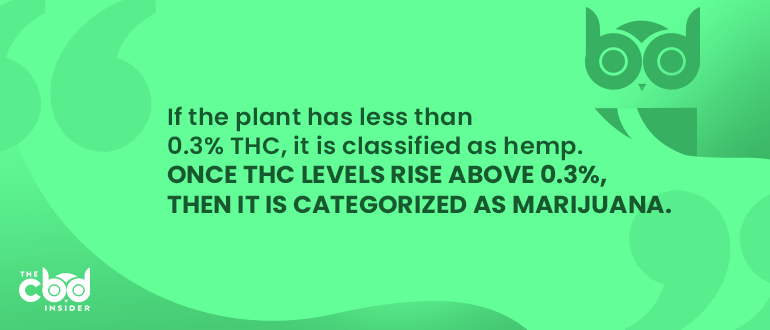
The cannabis plant produces CBD. This doesn’t mean that you will experience the intoxicating effects commonly associated with the plant’s main compound, THC.
The cannabis plant is categorized based on its concentration of THC. If the plant has less than 0.3% THC, it is classified as hemp. Once THC levels rise above 0.3%, the categorization of the plant then becomes marijuana.
If the label of your CBD oil states that it is hemp-derived, this means that the oil likely has less than 0.3% THC. You can verify this by checking that your CBD oil has a certificate of analysis (COA) from a third-party laboratory. A COA will also ensure that your product is free of other potentially harmful substances like pesticides or heavy metals.
If your CBD oil says it was derived from marijuana or if you purchased your CBD oil from a cannabis dispensary, then there is a chance that it contains more than 0.3% THC. If you’re not clear on your CBD oil’s contents, most brands are happy to answer any questions about their products. Most are easily accessible through their website or social media platforms. We’ve also put together a comprehensive guide of this year’s best CBD oils.
CBD is often referred to as the non-intoxicating cousin of THC. Although CBD doesn’t maintain THC’s recreational appeal, it still brings an assortment of potential health benefits to the table.
Conclusion
CBD oil can be a well-tolerated and generally safe addition to your routine as long as you follow the best practices outlined in this article. Although CBD oil isn’t completely risk-free, in most cases, the anecdotal evidence of potential benefits appears to far outweigh the possibility of adverse side effects.
Ideally, as more research becomes available, we will have a better understanding of this intricate compound. Until then, we recommend that you continue utilizing our CBD knowledge center and Trusted Brands tools. Our CBD Insider newsletter is also an excellent resource to keep tabs on the latest CBD news and product reviews.



